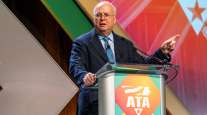Trucking Prepares for 2012
This story appears in the Oct. 24 print edition of Transport Topics.
GRAPEVINE, Texas — The nation’s top trucking executives left a crucial round of meetings here united behind a plan to campaign for a higher weight limit and resolved to fight port regulations before the U.S. Supreme Court but without a firm proposal on driver working hours or a federal commitment to transportation infrastructure improvement.
Members of American Trucking Associations also heard that their industry is stable and profitable, and that the economy will continue with less-than-average growth. They viewed exhibits of new products and services and elected Utah’s Dan England to succeed Maryland’s Barbara Windsor as ATA chairman before closing the annual Management Conference & Exhibition on Oct. 18.
In his annual state-of-the-industry address, ATA President Bill Graves synthesized the mixture of worry about limited economic growth and the threat of overabundant regulation, even as freight volumes continue to show growth over 2010 patterns.
“During this time of economic uncertainty, it’s easy to misjudge the opportunity that’s on the trucking industry’s horizon. Lord knows, we have a myriad of challenges,” Graves told MCE attendees.
“I can tell you that the economy will recover, and when it does, the trucking industry is going to be one of the first-in-line beneficiaries. I really believe we are blessed with a country, with a people and with an economy that is capable of surviving anything our government can throw at it,” Graves said.
Concerning productivity, ATA came to a strategic agreement to work with the Truckload Carriers Association on getting federal approval for increased truck weights.
For the past five years, ATA had endorsed a maximum of 97,000 pounds spread over six axles. The current limit is usually 80,000 pounds on five axles.
In contrast, TCA members prefer keeping five axles, but boosting the cap to 88,000 pounds. Ultimately, the boards of the two associations hit upon a compromise by supporting both options simultaneously. TCA members met here separately before the start of MCE.
As a tank-truck executive, Windsor follows truck weight issues closely. She said the weight of required equipment on tractors has been increasing in recent years, so higher gross weight limits would mean tank carriers would not have to haul lighter payloads.
Having won a significant, but partial, victory in federal court against the Port of Los Angeles in September, Graves confirmed at the conference’s closing press conference that ATA’s directors have decided to ask the nation’s high court to overturn other portions of the Court of Appeals ruling that favor the port.
The judges agreed with ATA that the port authority cannot ban owner-operators from working there. However, ATA wants to appeal the port’s requirement that drayage carriers provide financial and maintenance information.
What the fleet executives did not get was a firm proposal from the Federal Motor Carrier Safety Administration on driver hours of service. A federal court had told FMCSA to rewrite its HOS rule by Oct. 28, but ATA Senior Vice President Dave Osiecki said the agency probably will miss that deadline because the Office of Management and Budget has not yet begun its formal review.
ATA has argued that the existing rule has worked well because truck-involved fatalities per miles driven continue to decline. The trucking federation also has said it does not want to see the rule sharply tightened.
Also receding with the horizon is the notion of an economy reignited by a robust, far-reaching infrastructure development plan. ATA has sought a highway bill to succeed the transportation spending authorization that expired in 2009, but Congress has agreed only to a series of temporary extensions.
“I wish I could be optimistic about reauthorization, but that’s not happening anytime soon,” Graves said at the closing press conference.
Asked about gridlock between Democrats and Republicans, Graves said infrastructure is the most important case in trucking in which the industry cannot wait indefinitely for a resolution.
“Sitting on one’s hands in the case of infrastructure is bad,” Graves said.
The federation’s new chairman, England, is chairman of C.R. England Inc., Salt Lake City — the nation’s largest refrigerated carrier. He succeeds Windsor, CEO of Hahn Transportation, a New Market, Md., tank truck carrier.
England said at the press conference that he is angry about the deluge of regulation — federal and state — aimed at the industry.
“The president [Obama] says he wants to get out of the way of business, but in the trenches of regulation, it is rising at a rapid pace, especially with the National Labor Relations Board and hours of service,” England said. He added that litigation, including independent contractor issues, is also a major difficulty.




